|
|
|
|
| Kritiken 2006 |
| nur Ausschnitte/excerpts only |
|
|
| Mahler: "Das Lied von der Erde", Berlin,
12. Januar 2006 |
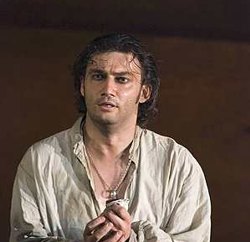
"Handsome tenor Jonas Kaufmann (Don Jose) has every wow factor you
can imagine."
"La qualité de prononciation, le charisme, la richesse psychologique,
la ligne au bord des lèvres de "La fleur que tu m'avais jetée", sa
densité sans poids, le corps à corps désespéré de la dernière scène,
tout fait de lui et dès cette prise de rôle un de nos plus grands Don
José." |
| Verdi: La Traviata,
Metropolitan Opera House, 4. Februar 2006 |
| Mozart: Lo Sposo deluso, K. 424a, Zürich,
5. März 2006 |
| Schubert: Fierrabras, Paris, 8. März 2006 |
| Mozart: Lo Sposo deluso, K. 424a, Paris,
9. März 2006 |
| Wagner: Parsifal, Zürich, April 2006 |
| Festkonzert
Saarbrücken, April 2006 |
| Die verkaufte Braut, Frankfurt, 21. Mai 2006 |
| Mozart: Requiem, Orange festival 2006 |
| Edinburgh, Recital, 24. August 2006 |
| Wagner: Die Meistersinger,
Edinburgh, 2. September 2006 |
| La damnation de Faust, Rom, 21. Oktober 2006 |
| Mozart: Die Zauberflöte, Metropolitan
Opera, October 2006 |
| Carmen, Royal Opera House, London, 8.
Dezember 2006 |
|
|
 |
|
| Mahler: "Das Lied von der Erde", Berlin,
12. Januar 2006 |
Berliner Morgenpost: Stille Wanderung
Mahlers Lieder-Sinfonie schwingt sich da schon zu ganz anderem
Klangvolumen auf, das indessen den tapferen Jonas Kaufmann nicht zittern
machte. Sein schlanker Tenor besitzt Elan und Durchsetzungskraft. Kaufmann
sang sich unverstört durch die heftigsten instrumentalen Aufgipfelungen:
ein schmaler Singathlet von reichem Ausdrucksvermögen.
Berliner Zeitung: Blind Date mit einem Klangkörper
Das hat frappierende Konsequenzen: Der Gesang, und mit ihm der Sänger,
wirken nicht mehr wie die Hauptsache, sondern treten nur noch als
Beschriftung des melodischen Geschehens auf, die Worte präzisieren den
melodischen Ausdruck. Dennoch sind die Sänger hochpräsent: Jonas Kaufmann
ist selbst im "Trinklied vom Jammer der Erde", dessen massiver
Orchestersatz normalerweise keinem Tenor eine Chance lässt, gut zu hören.
Der Tagesspiegel: Echo des Weltuntergangs
Das kommt nicht nur den beiden fabelhaften Solisten Petra Lang und Jonas
Kaufmann entgegen, sondern sorgt auch für Balance zwischen der artifiziell
entrückten Chinoiserie des Stücks und der spätromantischen Klanggewalt,
die hier nur untergründig, wie das grollende Echo eines Weltuntergangs,
spürbar bleibt. |
|
 |
|
| Verdi: La Traviata, Metropolitan Opera
House, 4. Februar 2006 (house debut) |
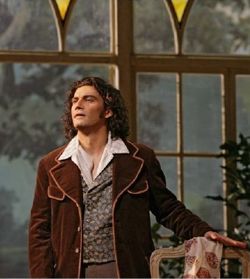 The
Sun: Verdi Would Be Proud The
Sun: Verdi Would Be Proud
The German tenor Jonas Kaufmann was making his Met debut as Alfredo.
First, he has what you might call tenor-star looks: long hair, a Byronic
profile. Second, he owns a substantial, regal voice. Often it is creamy
and refulgent. He was a little tight in Act I - particularly in the
Brindisi - but he opened up.
Alfredo's big aria is "De' miei bollenti spiriti," and Mr. Kaufmann
negotiated that well. But he dipped a little on that sustained final E
flat. He was also flat on a later high C - although the note was
essentially there. This was Angela Gheorghiu's night, but Mr. Kaufmann was
not a negligible presence.
Classics Today: GHEORGHIU AT LAST IN METS TRAVIATA
In his debut role at the Met, German tenor Jonas Kaufmann was more than
impressive. He is young, slim and handsome, and the voice is a grand
instrument, rich, and full, with an appealing "ping" to his high notes. He
sings fearlessly and acts well, paying attention to his colleagues as if
he means it. He came to grief at the close of his second act cabaletta
with a cracked high C, but otherwise was a fine, ardent, if not quite
Italianate Alfredo.
NYmag: Brangelina Sings!
Jonas Kaufmann not only has the look and easy stage bearing of a rock
star, but he also has a flexibility seldom heard in German tenors—he sings
Parsifal and Florestan with distinction, as well as lyrical roles like
Alfredo. If his voice lacks the ringing lift up top that one ideally likes
in a Verdi tenor, the overall tone is smoothly burnished, beautifully
focused on the notes, and always disarmingly musical.
Associated Press: Gheorghiu Triumphs in 'Traviata'
Kaufmann displayed dashing looks and a big shiny voice that bodes well for
his future. Program notes say he already is scheduled to sing heavier
roles such as Parsifal, which does not. He was said to be singing with a
cold, which might explain the tentativeness he showed early on as he tried
to find the right volume.
NYTimes: A Violetta to Conquer the Scenery
The Met greeted a new tenor as Alfredo: Jonas Kaufmann, a young German
with a beautifully constructed voice, suspect perhaps in its upper reaches
but otherwise filling the house nicely with an unforced clarity. Mr.
Kaufmann approaches every musical detail and theatrical nuance with great
care; he also looks good next to Mr. Zeffirelli's ravishing furniture and
clouded mirrors. I hope I'm not being unfair in finding something clinical
in the completeness of his performance.
Opera News: La Traviata, Metropolitan Opera, 2/4/06
Tenor Jonas Kaufmann made an impressive house debut as Alfredo, with a
warm, baritonal sound and brooding good looks. Even though his covered top
notes lack an Italianate ring, he is not afraid to sing with nuance or to
explore the lower end of the dynamic spectrum, and his conversational
delivery and naturalness of phrasing were most attractive.
Newsday: A headstrong, yet extraordinary Violetta
Making his company debut as Alfredo, tenor Jonas Kaufmann is a dashing
young man with a dark, throaty, not especially supple voice that he shades
with care. He brings impetuous fire to a role that can sometimes pass for
a Milquetoast, and there is a thrilling erotic undercurrent to his clash
with Violetta at Flora's party.
ConcertoNet.com: Une Violetta admirable mais qui n'émeut pas
Cette reprise de La Traviata valait aussi pour les débuts au Met de Jonas
Kaufmann, ténor allemand qui chante régulièrement à Zurich. Des débuts
ovationnés par les New Yorkais, qui ont visiblement apprécié non seulement
le physique agréable du chanteur, mais aussi sa voix aux teintes
barytonales et aux accents virils, une voix plus dramatique que celles
qu’on entend normalement dans le rôle d'Alfredo. D'ailleurs, le ténor ne
doit-il pas chanter prochainement Parsifal à Zurich? Gageons qu’après un
tel succès au Met, la direction de l’Opernhaus aura fort à faire pour ne
pas le laisser partir! |
|
 |
|
| Mozart: Lo Sposo deluso, K. 424a, Zürich,
5. März 2006 |
Neue Zürcher Zeitung: Schlicht und
ergreifend
Für die muntere sängerische Umsetzung sorgte ein Solistenquartett mit
Sandra Trattnigg (Sopran) Jonas Kaufmann (Tenor) Bogusaw Bidzinski (Tenor)
und Gabriel Bermúdez (Bariton).
Tages-Anzeiger: Irrtümer und Verwicklungen
..geben will worüber sich
Pulcherio (der hervorragende
Jonas Kaufmann)
mit beissendem Spott lustig macht. ... |
|
 |
|
| Schubert: Fierrabras, Paris, 8. März 2006 |
ConcertoNet.com: Réussite zürichoise à défaut dêtre Schubertienne!
Le rôle-titre est tenu par Jonas Kaufmann, pilier de l’opéra de Zürich. Ce
jeune ténor, à la carrière prometteuse et qui vient de se tailler un franc
succès au Met dans La Traviata, déploie une voix longue et puissante, avec
des harmoniques assez sombres pour un ténor. Il campe un Fierrabras rempli
de noblesse et son aisance scénique souligne bien la valeur héroïque du
personnage.
ConcertClassic.com: Fierrabras de Schubert au Châtelet, une
résurrection
On sait que Jonas Kauffman est le ténor du moment. L'écriture de
Fierrabras se coule avec bonheur dans sa voix longue, solaire, où le mot
est toujours intelligible, et sa silhouette juvénile enchante.
Le Figaro: Les rêves de Schubert
Jonas Kauffmann incarne Fierrabras, double douloureux de Schubert, avec
expressivité et émotion.
Opera News: PARIS Fierrabras, Théâtre du Chatelet, 3/12/06
Jonas Kaufmann, fresh from his triumphant debut at the Met in La Traviata,
was as fine an exponent as one could hope for in the role of Fierrabras,
whose selfless nobility is the positive message of the opera. His voice
carried almost Wagnerian weight and intensity of declamation in a role
that did not really exploit his vocal talents to the full.
Libération.fr: Au Châtelet, «Fierrabras» a fière allure
Un même esprit de troupe caractérise la distribution où l'on retrouve le
ténor Jonas Kaufmann dans le rôle-titre, |
|
 |
|
| Mozart: Lo Sposo deluso, K. 424a, Paris,
9. März 2006 |
ConcertoNet.com: Cabinet de curiosités
Les solistes, issus de la troupe zurichoise et/ou faisant partie de la
distribution de Fierrabras, défendent inégalement leurs rôles: dans un air
virtuose, à l’ambitus très étendu, l’Eugenia de Sandra Trattnigg peine
dans le grave, crie dans l’aigu et ne chante pas toujours juste, tandis
que Jonas Kaufmann livre une démonstration éclatante de perfection dans
l’air de Pulcherio. |
|
 |
|
| Wagner: Parsifal, Zürich, April 2006 |
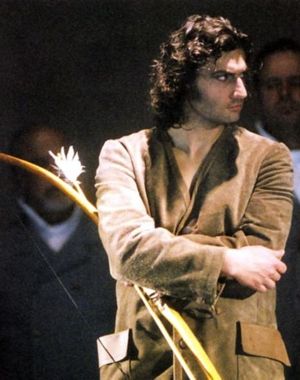 ConcertoNet.com:
Un nouveau titulaire pour Parsifal ConcertoNet.com:
Un nouveau titulaire pour Parsifal
Quoi qu'il en soit, les spectateurs n'ont rien perdu au change puisqu'ils
ont pu assister à la prise de rôle de Jonas Kaufmann. Auréolé de ses
succès récents à New York dans La Traviata et à Paris dans Fierrabras, le
ténor allemand a de nouveau conquis le public, cette fois dans un emploi
sensiblement plus lourd que les précédents. A son apparition sur scène, le
chanteur a belle allure, silhouette élancée, haut du corps nu sous une
veste de cuir, longue chevelure bouclée. S’il n’a pas la projection vocale
d’un heldentenor et si son Parsifal est plus lyrique que dramatique, il
sait en revanche compenser intelligemment le manque de puissance de sa
voix par un chant stylé, tout en nuances, sans jamais forcer, avec une
diction impeccable et un timbre plaisant, aux couleurs barytonales.
Parsifal vient de trouver un nouveau titulaire avec lequel il faudra
désormais compter!
Neue Zürcher Zeitung: Zeitlos stimmungshaft
Doch im Brennpunkt steht ohnehin der neue Parsifal, Jonas Kaufmann. Wie
würde der vielseitige Künstler, der eben noch im lyrischen Fach zu Hause
war und sich nun in grossen Schritten auf dramatische Partien zubewegt,
die Herausforderung bestehen? Seine Musikalität, seine stimmliche Substanz
und seine darstellerische Präsenz boten von vornherein gute
Voraussetzungen für dieses Rollendébut. Und dass die Partie in jene Höhen,
wo Kaufmann in jüngster Zeit manchmal Probleme hatte, gar nicht führt,
wirkt sich ebenfalls zu seinen Gunsten aus. So kann er seinen dunkel
gefärbten, in der Tiefe gut abgestützten Tenor frei strömen lassen und
sein kerniges, bisweilen etwas flackriges Timbre in den Dienst des
dramatischen Ausdrucks stellen. Ein vielversprechender Beginn.
|
|
 |
|
| Festkonzert zum 50-jährigen Bestehen des
Richard-Wagner-Verbandes Saar, April 2006 |
Saarbrücker Zeitung: Glutvolle Musik,
hochexpressiver Gesang
Zum Schluss zwei Parsifal-Auszüge: Ein Amfortas-Monolog mit einem
wunderbar geschmeidigen Gérard Kim und die Schluss-Szene des 2. Aufzugs
mit dem toll harmonierenden Paar May-Kaufmann. |
|
 |
|
| Die verkaufte Braut, Frankfurt, Premiere
vom 21. Mai 2006 |
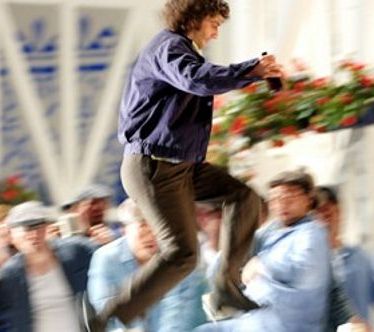 Aufführung
ohne böhmische Folklore: Menschen von hier und heute in ihrer kleinen,
engen Welt Aufführung
ohne böhmische Folklore: Menschen von hier und heute in ihrer kleinen,
engen Welt
Jonas Kaufmann gibt dem Hans die Züge eines Sunnyboys und wartete mit auf
Hochglanz polierten Spitzentönen auf.
weltexpress: Oper Frankfurt bringt Smetanas Verkaufte Braut im Irgendwo
Zentrum der Aufführung sind der gelenkige Hans des Jonas Kaufmann, der so
wirkt, als ob er jeden Tag in diesem Dorf unterwegs ist und auf den
Holzgerüsten und Tischen und Bänken herumklettert und als ob er schon mit
einem Triller auf den Lippen erwacht. „Cool“ sei der, sagte danach eine
jugendliche Gruppe und daß er mit Recht die Maria bekommt.
FAZ: Verkaufte Braut" neu in Frankfurt ( Boer/Winge)
Jonas Kaufmann als Rückkehrer Hans beeindruckt durch seinen
kraftvoll-heldischen Ton und einen vehementen Spieleinsatz.
Offenbach-Post: Doppelbödige Posse um "Verkaufte Braut"
Jonas Kaufmann gibt ihm das Profil eines Liebenden der durchaus auch
Zuhälter-Qualitäten an den Tag legt. Und er besitzt einen Tenor, der
höchste Töne schwerelos erklimmt - dazu mit einem wunderschön warmen
Timbre gesegnet.
kulturexpress.de: Auch das stimmliche Volumen von Jonas Kaufmann
(Tenor) hatte Wenzel die Braut gekostet in Smetanas Oper
Natürlich Hans, der Geliebte von Marie, mit Jonas Kaufmann, dessen Tenor
einen außergewöhnlichen Klang erreicht. Deren Fülle fast gar nicht zu
seiner jugendlichen Rolle paßt. Es ist erstaunlich welche Fähigkeiten
Menschen haben können, trotz ihres legeren Aussehens auf der Bühne. Jonas
Kaufmann kam zu Beginn der Spielzeit für einen Liederabend an die Oper. Er
trat bereits als Tenor zusammen mit Susan Craham auf und debütiert
2005/2006 an der Metropolitan Opera in New York. Er erhielt lauten Beifall
und bekam einen Blumenstrauß stehender Ovation auf die Bühne geworfen.
Frankfurter Rundschau: Böhmen liegt doch am Meer
Die beiden ganz großen Highlights der sonst leicht durchwachsenen
Aufführung waren der junge Tenor Jonas Kaufmann als Hans und die Marie von
Maria Fontosh, sängerisch und darstellerisch ein Traumpaar. ....
Hans’ heikle C-Dur-Arie mit ihrer relativ hohen tessitura wurde von
Kaufmann souverän aus der behutsamen Dynamik bis ins strahlende Forte
hineingeführt. Die Figur war ungemein lebhaft und nahezu akrobatisch
angelegt. Und es war klargestellt, dass Hans bei seinen nervenanspannenden
Unternehmungen reichlicher alkoholischer Nachhilfe bedarf.
Rhein-Zeitung: Frankfurts verschenkte Braut
Bei den Solisten ein Tenorfest: Jonas Kaufmann ist ein
jugendlich-heldischer Hans.
Frankfurter Neue Presse: Im Dorf glüht die Sehnsucht
Jonas Kaufmann hat Hans, den Liebhaber sehr deutlich positioniert: als
einen Optimismus und und Oberflächlichkeit paarenden Leichtfuß und mehr
kraft- als treuestrotzenden Macho – die Hoffnung des deutschen
Heldentenorwesens zeigt seine stimmlichen Möglichkeiten lachend leicht und
so stark, dass der Chor bierseliger Bauern schon einmal erschrocken
zurückweicht.
Opernwelt: Tief im Spießermief
Jonas Kaufmann sang ihn [Hans] souverän, in den Höhen schon stählern
dramatisch, in den mittleren und tieferen Lagen warm und flexibel. |
|
 |
|
| Mozart: Requiem, Orange festival 2006 |
L'Humanité: Folie, passion et bel canto au pied du mur d’Orange
...et - solistes d’un haut niveau, au premier rang desquels la
soprano, mozartienne dans l’âme, Soile Isokovski. À ses côtés, la
chaleureuse alto Julia Gertseva, le jeune et brillant ténor Jonas Kaufmann
et la somptueuse basse wagnérienne Albert Dohmen : un quatuor d’exception. |
|
 |
|
| Edinburgh, Recital, 24. August 2006 |
The Telegraph: Full-blooded ardour wins ovation
This nicely plotted programme allowed him to display his baritonal tenor
to advantage. He doesn't have the post-choirboy sweetness of tone that
characterised his German predecessors Fritz Wunderlich and Peter Schreier,
but he can match their musicality and elegance, as well as providing the
extra decibels that they couldn't manage.
The Scotsman: Jonas Kaufmann *****
The rapturous Morgen became a glittering jewel as Kaufmann's voice became
a whispering stream of sound.
Classical Source: Jonas Kaufmann & Helmut Deutsch
A quite wonderful recital
EIF review: Jonas Kaufmann and Helmut Deutsch
Kaufmann and Deutsch are now Festival regulars, and they just keep getting
better and better. The second half of this programme was a generous
selection of Strauss songs (somehow they don't seem to class as
conventional Lieder) from their new CD. The first half was even more
interesting, demonstrating their skills in a very varied repertoire.
ThreeWeeks eDaily: Jonas Kaufmann, Tenor, Helmut Deutsch, Piano
Jonas Kaufmann and Helmut Deutsch held the audience mesmerised for almost
two hours, from the Schubert extended ballad, 'Die Bürgschaft' - which
requires a singer of Kaufmann's calibre to maintain the dramatic
expression required by the narrative - until the end of their encore.
Scotland on Sunday: Little Britten triumphs
Sung grippingly last year by baritone Christopher Maltman, Kaufman is
altogether different, adept at vocal characterisation, taking the audience
through rain, flood and famine, marriage and near-death. When Kaufmann is
at his best, he paints pictures with his voice - Die Burgschaft was a
10-minute one-man opera, as intended.
Orpheus: Liedermatinee, Edinburgh, 24. August 2006
Für uns Briten waren natürlich die Michelangelo-Sonette von Britten ein
Ereignis, bei denen man sich wenig an die (stimmlich) fragile
Zusammenarbeit von Britten und Pears erinnerte, sondern eine kraftvolle,
gloriose und höhensichere Männergemeinschaft erlebte. Diese
erzitalienischen Lieder eines britischen Komponisten von zwei Deutschen
vorgetragen zu hören, ließ mich wirklich an Multikulturalismus denken. Die
zweite Hälfte ließ Kaufmanns Stimme noch leuchtender aufscheinen - das
Strauss-Programm zeigte ihn im Vollbesitz seiner künstlerischen und
stimmlichen Möglichkeiten bei voller Resonanz und bester Höhe. |
|
 |
|
| Wagner: Die Meistersinger von Nürnberg,
Edinburgh, 2. September 2006 |
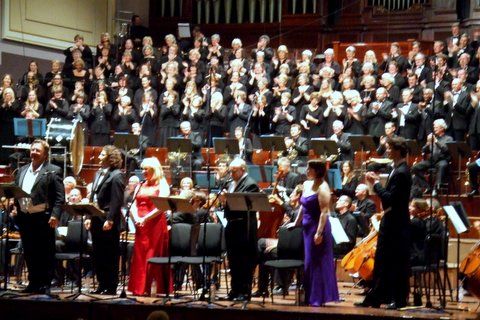 The
Spectator: Special affair The
Spectator: Special affair
and spectacularly with the Walther of Jonas Kaufmann, who brought such
deep understanding to his first performance of this role that for once
Walther became the cynosure he should be: he built the Prize Song with
surpassing skill, truly as a remembered dream.
The Scotsman: Wagner was desperately keen that his sole venture into
the field of comic opera should be a success
The part of Walther involves having to sing the prize song twice. Jonas
Kaufmann gave a very fine account of the role and took sensitive care to
offer subtle differences of interpretation in the various repeats.
The Scotsman: DIE MEISTERSINGER VON NÜRNBURG *****
Jonas Kaufmann's Walther glowed with rich, golden lyricism.
The Telegraph: A farewell filled with warmth and wisdom
Scarcely less good was Jonas Kaufmann, looking the part of the romantic
hero Walther to perfection and singing with all his usual firmness,
intelligence and artistry. Was he running out of puff at the very end? The
"Prize Song" lacked quite the transfiguring glow that Wagner intended.
The Financial Times: A fond farewell for McMaster's singers
Best of all was Jonas Kaufmann, who lent Stolzing's Prize Song the
softness of a Liedersinger.
The Times: Die Meistersinger
As a petulant, passionate Walther, Jonas Kaufmann proved a revelation:
yes, the role lies at the very limits of his lyric tenor, but his ardent
spontaneity was the evening's highlight.
Opera Now: Die Meistersinger von Nürnberg, Usher Hall, Edinburgh
Die Meistersinger is, of course, as much a story of love between Walther
von Stolzing (sung delightfully by Jonas Kaufmann)
guardian.co.uk: BBCSSO/Robertson
But there was another typical McMaster touch in developing young singers:
tenor Jonas Kaufmann sang his first Walther, and even if he sounded
strained by the third act, there was enough evidence that he will be ideal
casting for Wagner's wide-eyed knight in the future.
Musicweb International: Wagner, Die Meistersinger von Nürnberg
The young German tenor, Jonas Kaufmann, was the physical antithesis of the
typical heldentenor today – tall, thin and with lots of hair! Again, he
was singing the role for the first time and it showed. Not that it was
bad, far from it: it was superbly sung but without convincing me that he
is a stage Walther of the immediate future – not until he gains more
(vocal) weight. By the time he came to sing a compelling ‘Morgenlich
leuchtend’ he was using a crooning falsetto more than he should. |
|
 |
|
| Mozart: Die Zauberflöte, Metropolitan
Opera, October 2006 |
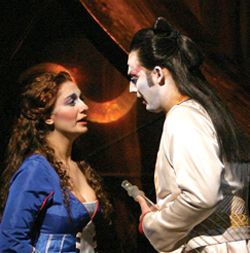 Opera
News: Die Zauberflöte Opera
News: Die Zauberflöte
Die Zauberflöte is at heart an operatic bildungsroman, a series of
adventures through which the hero Tamino gains maturity and spiritual
awareness. This is often unclear in performance. Papageno's slapstick, the
Queen of the Night's high F and Sarastro's low E all vie for our
attention; in their midst, Tamino can seem like a young man who wanders on
now and again to make pretty tenor noises. No such confusion afflicted the
Met's October 7 matinée, the opera's season premiere. As embodied by Jonas
Kaufmann, Tamino emerged as the work's lodestar. Kaufmann's brilliant
tenor proclaimed the character's primacy; it became the organizing
principal around which the opera's universe of extraordinary sounds was
arranged. When he maintained his vow of silence in Act II, the voice's
very absence made itself felt: the distinctive sound — lyricism writ large
— remained a phantom presence.
Kaufmann was immensely helped by Julie Taymor's celebrated production (new
to this reviewer). I went to this performance expecting to be wowed by
spectacle; on that level, the production delivered, but what was
surprising was how apposite the visual inventions were to the work at
hand. By presenting Sarastro's realm as a succession of wonders, it
encourages us to share Tamino's awe through the various steps in his
journey. The disparate elements that comprise Zauberflöte can cause a
performance of the opera to come apart at the seams; Taymor's
interpretation made for an unusually coherent piece of musical theater.
NY Times: Magical Puppets Brought to Life by Opera
Next to his jolly scampering, Jonas Kaufmann's Tamino seemed not only
princely and virtuous, but uptight and stiff. Mr. Kaufmann was fine
vocally, but was perhaps hindered by his stylized gestures and Kabuki
makeup from expressing real passion for Pamina.
ProOpera, Mexico: Die Zauberflöte
En lo estrictamente vocal, ya desde las primeras frases pudo intuirse cuan
próximo se encuentra el rol de mino a la vocalidad del tenor alemán Jonas
Kaufmann, quien ya en el aria del retrato "Dies Bildnis ist bezaubernd
schön..." lució una impecable línea de canto y una voz llena de gilidad y
ductibilidad, atributos que hicieron de su composición del Príncipe Tamino
un modelo de virtuosismo vocal a lo largo de toda la ópera. |
|
 |
|
| Berlioz: La damnation de Faust, Accademia di Santa
Cecilia Rom, 21. Oktober 2006 |
Giornale della musica: La dannazione di Faust: concerto o teatro?
Va detto che in tutto questo non è stato d'aiuto Kaufmann, il cui timbro
scuro bene si sposerebbe al personaggio di Faust, ma appariva afflitto da
problemi di raffreddamento.
Milano Finanza: Faust senza redenzione
Tra i protagonisti spicca il giovane Jonas Kaufmann la cui tessitura
spazia da tenero lirico nelle prime scene a baritenore nell'ultima parte;
perfetta la sua dizione francese.
Il Messaggero: Pappano, che bella "Dannazione"
Il diavolo, in verità, stava realmente per metterci la coda, perché i due
cantanti protagonisti, il tenore James Kaufmann e il basso Erwin Schrott
si erano ammalati durante le prove. Ma, con grande coraggio, ce l'hanno
fatta entrambi: al primo i postumi della malattia hanno dato un tono
sofferente che ha reso il suo Faust ancor più tormentato ed estatico; il
secondo è stato un Mefistofele "gran signore", dicitore tanto solenne
quanto insinuante.
Operaclick: Roma - Accademia S. Cecilia: La Damnation de Faust
Tre nomi altisonanti non riescono a regalare alcun momento di forte
comunicazione. Diverse le ragioni: alla poca rilevanza della voce di Jonas
Kaufmann, tenore di belle speranze, corrisponde un peso energico, ma
scarsamente gestito
Giornale della musica: La damnation de Faust: concert or theatre?
(Übersetzung)
It has to be said that Kaufmann was not particularly helpful in all of
this. Although his dark timbre would suit the Faust character well, it
would appear that he had a cold on this occasion. |
|
 |
|
| Carmen, Royal Opera House, London, 8.
Dezember 2006 |
|
 |
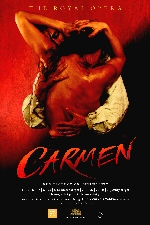 musicOMH:
Carmen musicOMH:
Carmen
By far the stand-out performance came from Jonas Kaufmann, making his role
debut as Don José. It's almost impossible to describe the virtues of his
interpretation, for they were so plentiful. His characterisation of the
role was easily the most convincing I have seen. Again thanks to the
costume designs and direction, we see José change from smartly-dressed,
reserved soldier in the opening scene to ragged, jealous lover in the
final scene. Cleverly, Zambello has Carmen climb the social classes as
José descends them. Kaufmann's singing, however, is what really deserves a
reward. In the most electrifying vocal performance of the season, the
tenor showed both lyrical phrasing and ringing high notes. What surprised,
delighted and moved me, though, was his shading down of the voice into an
almost falsetto region for the penultimate line of the Flower Song
(ardently delivered) and the final few lines of the closing scene. Ignore
the winter weather: queue now for day seats just to hear Kaufmann's
singing.
The Times: Carmen
Charisma shone from the stage nonetheless in Jonas Kaufman’s Don José. New
to the part, Kaufman immediately made a perfect fit. He is full of furtive
looks at first — still the man originally bent on the priesthood. The more
smitten Don José becomes, the looser his body, the more dishevelled his
hair, the more beautifully anguished Kaufman’s tenor. Declaring his love,
and his guilt, in his big Act Two aria, he finally raised this
production’s temperature.
Financial Times: Carmen becalmed
There is one star performance – Jonas Kaufmann’s Don José. Handsome
without trying to look macho, he portrays a naïve man unable to control
his passions. Kaufmann is a natural actor, wearing his innocence easily
but masculine enough to make a believable suitor. And he brings
mesmerising intensity to the murder scene.
What sets him above all other interpreters I have heard is his singing.
Although the voice has heroic edge, he uses it lyrically: the “Flower
Song” is sustained in a way that marries sentiment and line. Kaufmann is a
stylist, betraying none of the fragile temperament associated with tenors.
Could he be Domingo’s heir? Several times during this performance I
thought so.
Another plus is his chemistry with Anna Caterina Antonacci, the best
partnership in this opera since Agnes Baltsa and José Carreras.
guardian.co.uk: Carmen
Kaufmann establishes the troubled nature of José's sexuality at the outset
by furtively glancing at the tobacco factory long before Anna Caterina
Antonacci's Carmen has issued from its smoky depths. ....There's some
fabulous singing. Kaufmann, his voice rearing with desire and choking with
emotional agony, is the finest José to be heard for ages.
The Telegraph: Gypsy charms lift flat Carmen
Jonas Kaufmann is equally impressive as Don José, a man clearly out of his
emotional depth, whose uncertainty about himself and his desires pushes
him headlong into murderous insanity. I've never heard a German tenor sing
French music with such fine style.
"The Flower Song" was touchingly and intimately done – a shy confession of
first love rather than a tenor showpiece – but he could fire big guns in
the last scene, too. Together, he and Antonacci made deep psychological as
well as musical sense of their encounters, and the audience rightly
rewarded them with an ecstatic reception.
Bloomberg: Royal Opera's Lavish 'Carmen' Has Steamy Gypsy, Dreamy Hero
Handsome tenor Jonas Kaufmann (Don Jose) has every wow factor you can
imagine. He convincingly metamorphoses from a callow youth to a man driven
to the edge of sanity by his passion, but somehow doesn't let his distress
compromise his ringing high notes. It's a tour-de-force performance that
should get Hollywood, let alone the rest of the world's opera houses,
knocking on his door.
Evening Standard: No smoke but plenty of fire
Where this production scores, giving fresh urgency to the central
relationship, is in the Don José. Too often, the spurned lover is played
as the kind of tubby dullard Carmen would never glance at in the first
place. But the dark-eyed Jonas Kaufmann, who's stepped straight out of a
Caravaggio, brings subtle intelligence and dignity to the role. For once,
you believe in his charms.
Kaufmann, a gifted Lieder singer, is interested in musical and dramatic
fidelity rather than showy heroics. Indeed, his high notes were mostly
hushed, expressive, held back. This poetic reading was encouraged by
Antonio Pappano, newly signed up for another five years as ROH music
director, who opted for often spacious tempi and daringly languid
pianissimi. Orchestra and chorus stylishly entered the Gallic-Spanish
spirit.
The Independent: A bloodless tale of love and lust
An even bigger risk was the casting of the gifted German tenor Jonas
Kaufmann as Don José. But it was a gamble that paid off big-time. Yes, you
could argue that this elegant singer lacks the vocal heft for the
soul-baring show-downs of Acts III and IV, but in so doing you must also
remember that Don José is a emotional weakling, a lovesick mummy's boy
destroyed by his own misplaced infatuations. Kaufmann conveyed that
absolutely, with phrase upon melting phrase pointing to the soft-centred
romantic beneath the toy soldier's uniform. But there was a core of
strength, too, and in his convincingly low-key reading of the final scene
he was all the more dangerous for being so completely and utterly the
little boy lost. What a talent this young singer is.
The Stage: Carmen
She is well matched by the Don Jose of German tenor Jonas Kaufmann, whose
voice may lack a heroic ring but who paces himself beautifully. His
character study is complex and rewarding, and his Flower Song a highlight.
Daily Mail: Sexy Carmen really heats up the house
But the cast resolutely refused to be upstaged by the livestock, the
athletic Don Jose (Jonas Kaufmann) even abseiling down a cliff to join the
smugglers.
....And it is the terrific performances of Antonacci and Kaufmann that
really set this production alight.
....And the lithe German tenor makes a huge impact as her jealous lover:
tortured and goaded, he slinks madly and inexorably to his murderous fate.
He sings the role with baleful beauty - surely the best since Domingo.
timeout: Fri Dec 22 Royal Opera House
Not for the first time the thought occurs that the work should be entitled
'José'. It's not the diva's fault: the tenor's role is a brilliant
chronicle of an emotional journey. José actually develops and changes,
Carmen stays the same. She has three show-stopping numbers, he has the
Flower Song, which Jonas Kaufmann turns into a passionate psychological
drama, delivered with such intensity (and burnished tone) that it scored
the first night's biggest ovation
The Observer: Frills, trills and animal passion
The German tenor Jonas Kaufmann perfectly captures José's bewildered
despair, both as the ponytailed soldier and the tousle-haired deserter
destroyed by unrequited love. He and Antonacci are that rare breed: superb
singers who can also act with subtlety and passion. This dynamic duo alone
is worth even Covent Garden's price of admission....From the opening bars
of the swashbuckling overture, Antonio Pappano sets a cracking pace in the
pit, lending the entire evening an animal vitality, pausing for breath
only at such magic moments as Kaufmann's exquisite mix of guilt and
passion in the 'Flower Song'.
Variety.com: Carmen
She's given a run for her money in a career-making perf from Jonas
Kaufmann as Don Jose. Having specialized in Mozart, this role catapults
him into a whole new sphere. Out go the expected heroics; in comes subtle
phrasing in a role that normally consists of smoldering and showing off.
Kaufmann carefully builds intensity from a studiedly casual start to a
powerful love-wrecked final scene. Better still, instead of floridly
over-singing his second-act declaration of passion (a favorite tenor
habit), he pulls auds toward him by dropping to a brave, quiet, uncovered
sound at the very top of his voice. It also won't hurt his prospects that
he's a completely convincing actor who is tall, slim and handsome to boot.
Classical Source: Carmen
The current cast of the production has one absolute ace up its sleeve in
the form of the Bavarian tenor Jonas Kaufmann, who gives as complete a
performance as Don José as one could ever expect to hear. From the start
not only was the role superbly and subtly vocalised, but also the
character’s gradual decline was depicted not only in some great and
natural acting but also in the vocal character as well. Don José’s
emotional aspect of the character registered immediately and as the
evening went on, increasing frustration and desperation crept into the
tone, matching his increasingly shabby and shaggy demeanour. Kaufmann is
not a tenor for histrionic effects, however; the ‘Flower Song’ was
beautifully lyrical, ending on a true pianissimo, and his ringing tones in
the final duet were thrilling as well as upsetting.
MusicwebUK: Carmen
It was Jonas Kaufmann’s Don José who received the acclamation from the
audience of a type rarely awarded to any tenor whose name is not Domingo.
His was an portrayal worthy of that great singer as he went from awkward
Corporal still trying to shake off his priesthood training, through lust,
jealousy, the pity of the lovelorn and finally to murderous rage. His
voice is secure throughout the range, he has burnished tones and he
tackles his top notes with care but gets there effortlessly. As a German
with male model looks, of course, the thoughts of Wagner roles cannot be
far away. I have already heard his lyrical Walther von Stolzing and he has
Parsifal in his repertoire. As he approaches 40 he must surely add
Lohengrin and Siegmund before long and then the pressure will be on for
him to try and sing Siegfried because he would be a Hollywood producer’s
dream in the part. I hope this will not be too soon, but I hope to be
there when he does.
The Sunday Times: If you can't stand the heat...
Zambello is lucky with her protagonist this time round. Kaufmann is the
first German tenor I have seen in this quintessentially French role, but
he has everything for the part: youthful, Mediterranean good looks; a
dark, baritonal timbre; excellent French; and an ability both to phrase
his music stylishly and to sing viscerally thrilling high notes. I don’t
think I have heard a more beautiful account of José’s Flower Song, crowned
with an exquisitely modulated, pianissimo B flat — one of the trickiest
things any romantic tenor has to do, and almost invariably belted out by
some of the most famous names in the business. Kaufmann may not have a
record company behind him, but he is rapidly emerging as one of the most
important, and versatile, singers of our age. He still sings Tamino in
Mozart’s Magic Flute, and is dipping his toes into Heldentenor repertory.
The Independent: Carmen, Royal Opera House
With naturally light voices, both are forced to concentrate on the text,
to shape their phrases as artfully as they can, and to make Carmen and Don
José more than a stabbable vamp and a slappable wimp. This has little to
do with traditional great singing, and everything to do with the direct
communication and frank emotionalism of the great cabaret chanteurs and
chanteuses. As Kaufmann conveys the increasingly sharp disconnect between
the dutiful mother's boy and the man who left Navarra with a murder
record, and Antonacci dissects the vulnerabilities behind Carmen's casual
cynicism, the Habanera, Seguidilla and Flower Song are newly poignant,
supple and sensual..... Somewhat guiltily, I realise that I invariably
favour less overtly glamorous productions. But for the complexity and
honesty of what happens between Antonacci and Kaufmann, and the blistering
energy and intelligence of Pappanpo's conducting, I'll take as many
urchins and acrobats as you care to throw at me.
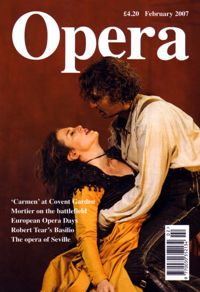 OPERA:
Carmen OPERA:
Carmen
On this occasion the star of the show was the German tenor Jonas Kaufmann,
in his role debut as José. From his first appearance he conveyed the
complex personality of this misfit and brought a Lieder singer's
intelligence to the role without sounding at any time un-operatic. The
Flower Song was exquisitely phrased, with an attention to Bizet's dynamics
which was as pleasing as it is rare. Tall, handsome and moody, he set a
new standard for the role; his final encounter with Carmen had one on the
edge of one's seat through his dramatic intensity.
Opera News: Carmen Royal Opera House
Antonacci was finely matched by the Don José of Jonas Kaufmann, another
artist of significant musicality and intelligence. He's not a vocal bruise
of a corporal — indeed he's a little on the light side — but he deploys
his voice so cannily that one never really notices. Above all, he shaped
every line beautifully, making a great thing, quite properly, out of the
flower song. As an actor, he was expert and considered, charting José's
fall from grace into violence with a careful and revealing attention to
dramatic detail.
The Spectator: Carmen Royal Opera House
In that it’s in the strongest contrast to the Don José of Jonas Kaufmann,
which is in all respects on a level that puts the rest of the production
in the shade. He is not at all a stage-hogger, it’s just that he has a
magnificent tenor voice, the finest heard at Covent Garden for quite some
time, and is a gifted, intuitive actor who conveys a strong sense of
humanity; in that he is like his great teacher Hans Hotter. Don José is
very difficult to make a plausible, coherent character of: indecisive,
with a self-confessed history of violence, it’s not easy to see why
someone as tough as Carmen would look at him twice. He can be interpreted
as a psychotic, which is how Jon Vickers, the finest José I have seen
before Kaufmann, read him, with a voice to match. Kaufmann makes him as
dignified as possible, but uncomprehending of so extravagant a phenomenon
as Carmen, so that he virtually achieves tragic dimensions. In the final
scene he is so harrowing that even after an evening of impertinent
applause, beginning halfway through the Prelude, I was still shocked at
how soon the cheering began.
Wall Street Journal: London Opera
Jonas Kaufmann's finely detailed José is very much the failed aspirant
priest, a mother's boy who goes berserk when he gets his first real whiff
of female sexuality. A celebrated young Lieder singer, the darkly handsome
tenor's pianissimo top note at the end of Act II evokes comparisons with
Jussi Björling and Nicolai Gedda.
Mundoclasico.com: Postcard from Andalusia
Jonas Kaufmann, on the other hand, warmed to the task as the opera
proceeded: he sang the “air of the flower” beautifully, although he
sounded rather emasculated (especially as his final B was raspy). From
then on, however, he sounded virile and thrilling, especially in the final
duet. This might be the reason why Kaufmann (also debuting his part) got a
better ovation from the audience.
The Express On Sunday: This tale of passion doesn't quite click
German tenor Jonas Kaufmann by contrast is a compelling Don Jose. From
being a conscientious corporal throwing a guilty glance at the provocative
cigarette girl from behind a newspaper he develops into a wild haired
outlaw torn between his moral duty and his desire for Carmen. The passion
and anguish with which he sang his Act Two aria deserved the prolonged
applause. Certainly the most convincing and best sung Don Jose I have
seen.
Giornale della musica: La Carmen di Pappano
In compenso Jonas Kaufmann è un Don Josè lirico ed intenso, dal timbro
scuro ma dagli acuti sicuri, e l'unico a creare un reale coinvolgimento
emotivo.
Il Giornale: Un fascinoso soprano italiano conquista il Covent Garden
Jonas Kaufmann in Don José (ruolo qui rifiutato da Alagna... ),
espressivo, le note quasi sussurrate, toccante nella canzone del fiore.
Famoso cantante di Lieder, Kaufmann è più interessato alla fedeltà
drammatica che a far spettacolo, incoraggiato dalla bacchetta
elettrizzante e poetica di Antonio Pappano: il magnifico duetto con Carmen
fuori le mura della maestranza di Siviglia nell’ultimo atto, tocca infine
la vetta tragica dell’opera, superbo Kauffmann, feroce, nobile e splendida
l’Antonacci nella donna che non cede la sua libertà. Lunghi e calorosi gli
applausi. Repliche fino all’8 gennaio.
Diapason: Don Jonas
La soirée restera pourtant mémorable, pour un couple Carmen-José qui la
transfigure......
La torche vive aurait pu jeter dans l'ombre son partenaire : Kaufmann lui
aussi triomphe. Et bouleverse. La qualité de prononciation, le charisme,
la richesse psychologique, la ligne au bord des lèvres de "La fleur que tu
m'avais jetée", sa densité sans poids, le corps à corps désespéré de la
dernière scène, tout fait de lui et dès cette prise de rôle un de nos plus
grands Don José.
Crescendo, Belgien: A LONDRES, Carmen
La distribution était dominée par le superbe Don José du jeune ténor
allemand Jonas Kaufmann qui débutait dans le rôle: physique idéal, jeu
naturel et expressif, belle voix claire et bien conduite, musicalité, et
style parfaitement adapté à l’opéra français.
Mundoclasico.com: Postal de Andalucía
Por otro lado, Jonas Kaufmann mejoró poco a poco: cantó bien su “aria de
la flor”, aunque sonó algo afeminado (especialmente porque su Si final
sonó sordo). Sin embargo, a partir de ahí sonó viril y emocionante,
especialmente en el dúo final. Ésta puede ser la razón por la que Kaufmann
(que también debutaba su parte) se llevó una ovación mejor.
AVUI: Carmen
Kaufman és un tenor que no deixa de sorprendre en els repertoris més
dispars. La seva inconfusible veu fosca és apta per als pianissimos més
eteris (com el que va coronar una ària de la flor immarcesible) i alhora
té l’empenta suficient per als esclats més dramàtics de Don José.
Opernwelt, Februar 2007: Ohren auf, Augen zu
Star des Premierenabends war Jonas Kaufmann: ein attraktiver Don José ohne
Macho-Gehabe. Kaufmann zeichnet das Porträt eines naiven jungen Mannes,
der seine Leidenschaft nicht in den Griff bekommt. Er ist ein geborener
Schauspieler, verkörpert genau jene Mischung aus Unschuld und Virilität,
die ihn als Don José glaubwürdig erscheinen lassen. Kaufmanns Stimme hat
durchaus einen heroischen Zug, doch setzt er sie lyrisch ein: In der
«Blumenarie» erreicht er ein beglückendes Gleichgewicht zwischen Spannung
und klarer Linie. Ein Stilist, der frei von jenen Unwägbarkeiten des
Temperaments zu sein scheint, die so oft bei Tenören anzutreffen sind.
Auch die Chemie mit Anna Caterina Antonacci stimmt – die beste
Bühnenpartnerschaft in dieser Oper seit Agnes Baltsa und José Carreras. |
|
|
| |
|
|
|
|
|